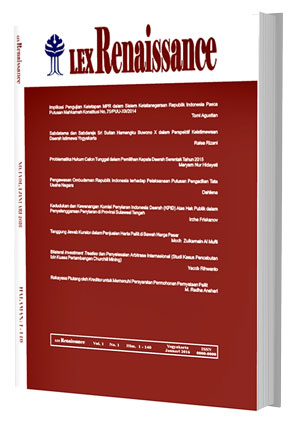Main Article Content
Abstract
Notary deed is the perfect, strongest, and most complete proof of evidence, thus not only guaranteeing legal certainty but also avoiding disputes. In practice, however, disputes often arise due to the existence of a notary deed. The notary can be liable for his action in making authentic deeds that are not in accordance with the applied provisions or are carried out against the law. This study has 2 formulations of the problem, first, how is the validity of the deed made before a notary containing fraudulent acts according to the Decision of Supreme Court Number 1003 K/PID/2015, and second, how is the notary's liability for the notarial deed containing fraud. The method in this study is normative legal research. The results show that, first, based on the Decision of Supreme Court Number 1003 K/PID/2015 in conjunction with the decision of Pekanbaru District Court Number 247/Pdt.G/2016/PN.Pbr, the Notary Deed No. 149 dated March 30, 2011 is declared valid and valuable before the law, but in terms of the strength of evidence, it is degraded from authentic deed to private deed for violating Article 48, 49, 50, and 51 of Law on Notary concerning Investigators. Second, the notary's legal duty for the deed containing fraud includes criminal, civil, and administrative liabilities.
Keywords: Authentic deed; fraud; notary
Article Details
Authors who publish with this journal agree to the following terms:
a. Authors retain copyright and grant the journal right of first publication with the work simultaneously licensed under a Creative Commons Attribution License that allows others to share the work with an acknowledgement of the work's authorship and initial publication in this journal.
b. Authors are able to enter into separate, additional contractual arrangements for the non-exclusive distribution of the journal's published version of the work (e.g., post it to an institutional repository or publish it in a book), with an acknowledgement of its initial publication in this journal.
c. Authors are permitted and encouraged to post their work online (e.g., in institutional repositories or on their website) prior to and during the submission process, as it can lead to productive exchanges, as well as earlier and greater citation of published work (See The Effect of Open Access).



